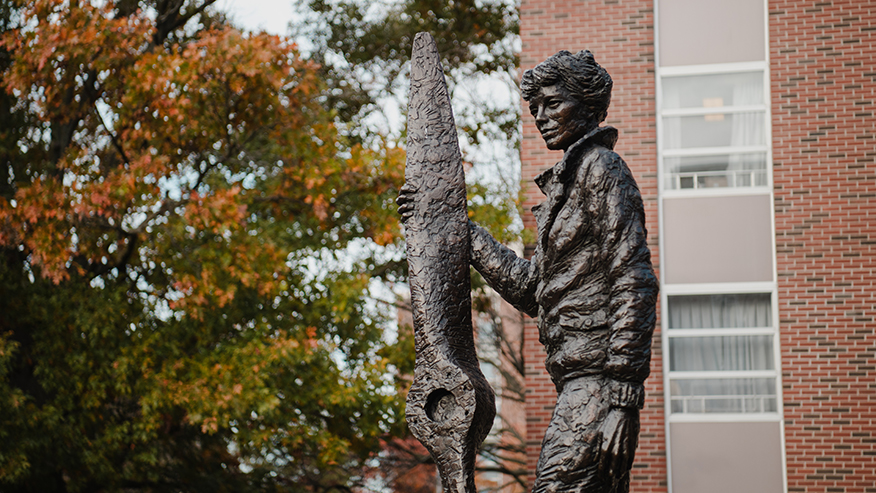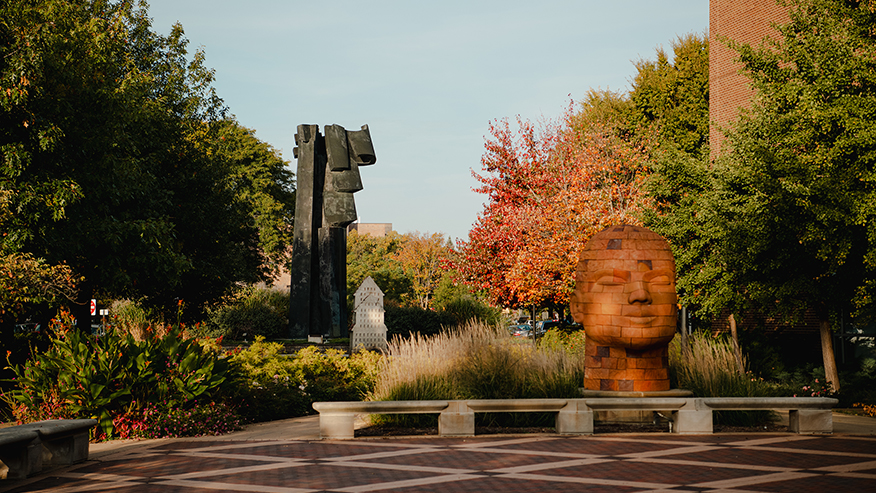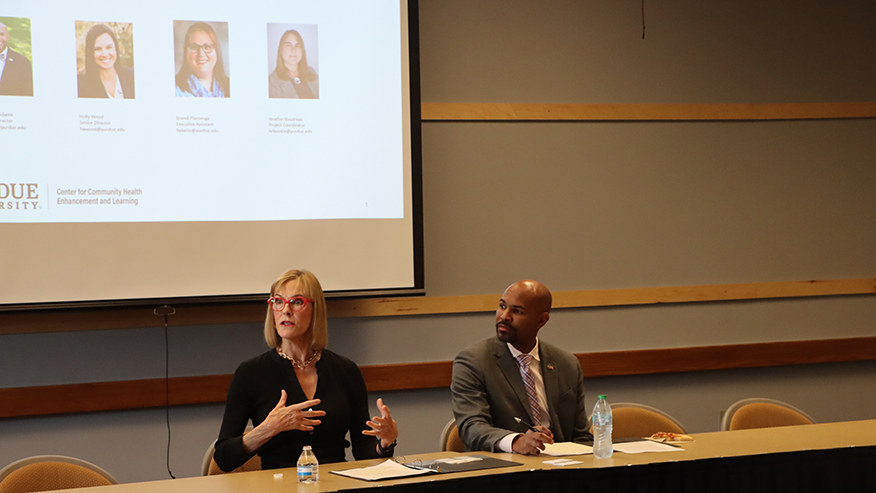Purdue trustees ratify faculty, staff positions; award posthumous degree; approve new degree programs, resolutions of appreciation and namings

WEST LAFAYETTE, Ind. —
The Purdue University Board of Trustees on Friday (Dec. 8) ratified faculty and staff appointments, awarded a posthumous degree, and approved new degree programs and resolutions of appreciation.
The newly ratified positions are:
- Yuehwern Yih, who was named the Tompkins Professor in Industrial Engineering.
- Christopher Uyeda, who was named the Herbert C. Brown Chair in Chemistry.
- Herman Sintim, who was named a Distinguished Professor in Chemistry.

Yih joined the Purdue School of Industrial Engineering faculty in 1989. Her research focuses on the fields of health and humanitarian supply chains and smart production systems. Yih is director of the Smart Operations and Systems Laboratory, director of LASER PULSE (Long-term Assistance and Services for Research, Partners for University-Led Solutions Engine) at the Purdue Applied Research Institute, and previous associate director of the Regenstrief Center for Healthcare Engineering at Discovery Park District at Purdue. She is an Institute of Industrial and Systems Engineers fellow and an Executive Leadership in Academic Technology and Engineering fellow. Yih’s other honors and awards include the National Science Foundation Young Investigator Award, the Dell K. Allen Outstanding Young Manufacturing Engineer Award from the Society of Manufacturing Engineers, Purdue’s Inaugural Faculty Engagement Fellow Award and Outstanding Leadership in Globalization Award, the College of Engineering’s Most Impactful Faculty Inventors recognition, and the School of Industrial Engineering’s Pritsker Outstanding Undergraduate Teaching Award (three-time honoree). She has over 200 scholarly publications, one patent and two copyrights. Her humanitarian supply chain system implemented in South Sudan and Ukraine has reached over 1 million people as of today.

Uyeda joined Purdue in 2013 and is currently the Richard B. Wetherill Professor of Chemistry. His research focuses on developing new types of catalysts based on Earth-abundant metals in the first row of the periodic table. He also seeks to discover new reactions promoted by these transition metal catalysts for the synthesis of pharmaceutical compounds and organic materials. Uyeda has over 50 publications, and his awards and honors include the Camille Dreyfus Teacher-Scholar Award, Kavli Fellowship, Lilly Grantee Award, Alfred P. Sloan Foundation Fellowship, NSF CAREER Award, Purdue Seeds for Success Award, and College of Science Faculty Award for Outstanding Contributions to Undergraduate Teaching. He is an associate editor for Science Advances and a member of the Purdue Institute for Drug Discovery, Tau Beta Pi Engineering Honor Society and American Chemical Society.

Sintim has been a professor in Purdue’s Department of Chemistry since 2015. In 2022 he became the Richard B. Wetherill Professor of Chemistry and Drug Discovery, with his research focusing on using synthetic organic chemistry to reveal important insights into biology. Sintim co-founded KinaRx LLC and previously served as program director at the NSF’s Division of Chemistry. His awards and honors include the Lafayette Lions Club Cancer Research Award, Sigma Xi distinguished lectureship, NSF CAREER Award, Camille Dreyfus Teacher-Scholar Award, Kavli Fellowship (Indo-U.S. Frontiers of Science) and Oxford Research Scholars Fellowship. He serves as an associate editor for Science Reports and Molecules and is on the editorial advisory boards of two American Chemical Society journals: ACS Medicinal Chemistry Letters and ACS Infectious Diseases. He previously served on the editorial advisory board of the Royal Society of Chemistry journal Molecular BioSystems (now Molecular Omics). Sintim has over 165 publications and five awarded patents.
Trustees also approved the ratification of Andrew Mesecar as the Robert Wallace Miller Director of the Purdue Institute for Cancer Research — an endowed position established for attracting and/or retaining a scholar who will provide leadership in discovery, learning and engagement related to the institute’s mission.
Mesecar, who is assistant vice president, Distinguished Professor of Biochemistry and the Walther Professor in Cancer Structural Biology, assumed his role Sept. 1 following a nationwide search, after serving as interim director since August 2022. During his interim leadership, Mesecar led the transition of the Purdue Center for Cancer Research to the Purdue Institute for Cancer Research, in recognition of its interdisciplinary and campuswide reach and its expanded mission to train students and postdoctoral researchers in cancer research to increase the biomedical workforce.
In other action, trustees awarded a posthumous Doctor of Philosophy degree in electrical and computer engineering to Zelong (Bruce) Ding, from Purdue West Lafayette.
Trustees approved two new degree programs for Purdue West Lafayette beginning in fall 2024: Master of Business and Technology and Master of Science in Artificial Intelligence.
The interdisciplinary Master of Business and Technology degree program through the Mitchell E. Daniels, Jr. School of Business will blend the university’s strengths as a recognized leader in business and technological research and education to produce a new wave of leaders who are proficient in navigating the complexities of the modern business landscape marked by rapid technological evolutions. Informed by innovative advancements, students will be well versed in robotics and automation, technology commercialization, computational finance and AI innovations — and thus encouraged and equipped to innovate pioneering technology-driven business models and ventures.
The interdisciplinary and fully online Master of Science in Artificial Intelligence degree program will leverage Purdue’s strengths as a recognized leader in STEM-related research and academic programs, in alignment with the Purdue Computes strategic initiative. The larger degree program will include two new majors to support the needs of AI builders and AI translators. The AI builders track (MS in artificial intelligence, major in AI and machine learning) will focus heavily on infrastructure, development and implementation of artificial intelligence. The AI translators track (MS in artificial intelligence, major in AI management and policy) will provide a foundational overview of AI for business leaders and policymakers to bridge the gap between ideation and implementation and implement change management principles to assist with adoption and strategy of AI in the workplace.
With a steady demand for community clusters and a growing need to support the future of AI computing, trustees approved a two-phase, $6.1 million budgeted life cycle refresh of the “Gautschi” community cluster, to begin in mid-2024. In phase one, the Gautschi cluster will receive an upgraded configuration with more powerful nodes and a larger system. Approximately one-third of Purdue’s 2023 earned doctorates, 3,000 students from 167 classes, and 261 principal investigators (PIs) across Purdue’s three campuses use community clusters. Further, Purdue’s financial investment in this key core facility has already enabled $364 million of research expenditures in fiscal year 2023. In phase two, the community cluster will be built upon to better support AI computing needs. Purdue AI faculty and labs investing in the program have grown, up from 11 PIs in 2017 to 72 in 2023.
In addition, trustees approved resolutions of appreciation for friends of the university who recently contributed $1 million or more to Purdue. Those are:
- Amanda and Eric Goss, to support the College of Engineering.
- Marshall and Berdine Martin, to support the College of Agriculture.
- Cortland and Vickie Gundling, to support the School of Aviation and Transportation Technology.
- Kevin and Suzanne Kahn, to support the College of Science.
- John Martinson, to support the College of Liberal Arts.
- John and Lisbeth Kling, to support Purdue University.
- John and Diana Odum, to support the College of Agriculture.
- Christian Piller, to support the Mitchell E. Daniels, Jr. School of Business.
- An anonymous gift, to support the School of Mechanical Engineering.
- An anonymous gift, to support the College of Science.
Furthermore, trustees approved the following namings:
- Kevin and Suzanne Kahn Sustainable Green Roof and Patio — in recognition of Kevin (College of Science 1973) and Suzanne (College of Health and Human Sciences 1974) Kahn for their support of the Data Science renovation construction project.
- John Martinson Entertainment and Engineering Laboratories — in recognition of John Martinson (School of Aeronautics and Astronautics 1971) for his creation and support of the John Martinson Strategic Development Fund to aid the Fusion Studio in its development of several new initiatives, such as an online professional certificate in structural engineering, high school summer camps and the establishment of four entertainment and design laboratory spaces within Stewart Center.
About Purdue University
Purdue University is a public research institution with excellence at scale. Ranked among top 10 public universities and with two colleges in the top 4 in the United States, Purdue discovers and disseminates knowledge with a quality and at a scale second to none. More than 105,000 students study at Purdue across modalities and locations, with 50,000 in person on the West Lafayette campus. Committed to affordability and accessibility, Purdue’s main campus has frozen tuition 12 years in a row. See how Purdue never stops in the persistent pursuit of the next giant leap, including its first comprehensive urban campus in Indianapolis, the new Mitchell E. Daniels, Jr. School of Business, and Purdue Computes, at https://www.purdue.edu/president/strategic-initiatives.
Sources: Patrick Wolfe, Karen Plaut, Ian Hyatt, April Headdy, Yuehwern Yih, Christopher Uyeda, and Herman Sintim



